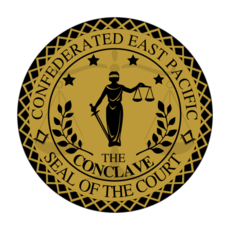The Conclave hereby announces that it has received from Citizen Aurora Yukihime a request to review the interpretation of the Eastern Pacific Sovereign Army Act.
Law in Question: Eastern Pacific Sovereign Army Act
Questions:
-
Is a region that is deemed by wide consensus “OOC bad” by the popular NS community be an exception as listed in Section 2.2.3?
-
Could a known Do-not-Defend (DnD) order be an exception, if suitable reasons in Section 2.2.3 are cited?
-
Confirming, especially in the case of a negative response to any above, that such behaviors as being transphobic, homophobic, racist, etc., are all acceptable ideologies would qualify as an exception to Section 2.2.3?
The following procedures will be followed. The Conclave shall, according to its standing orders, deliberate and reach a verdict on the questions raised for review within the time period allocated under the Standing Orders.
— Begin quote from ____
2.1.1- Judicial Review of a Law shall take place following its passing, its request by the Delegate, a Magisterial Vote, a Vizier Vote, a citizen with a confirmation vote by the Conclave, or a constitutional challenge by a citizen in a civil trial. A Review shall last no more than 7 days but may be extended 3 days at the request of an Arbiter.
2.1.2- Upon receipt of request, the Viceroy shall initiate public and private threads which outline the bill in its entirety, along with the end-date for the deliberation of the law.
…a. The public thread shall be available for citizens to refer precedent or applicable laws to the Conclave, but subject to censure at the request of any Arbiter.
…b. The private thread shall contain the deliberations of the Conclave and be used to draft verdicts and debate the law.
2.1.3- The Review shall rule on the interpretation or constitutional validity of a law, factoring the Concordat, all applicable statutory laws, precedent of the court, and traditional values of The East Pacific for their deliberations.
2.1.4- Draft verdicts are prepared by Arbiters, listing reasoning and legal references to be voted upon.
…a. For the first vote, a draft verdict may only pass by unanimity.
…b. If the vote fails, consequent votes shall be held until a draft verdict receives majority support.
…c. The dissenting minority of Arbiters may choose to file a minority report of their verdict to be appended to the majority verdict.
2.1.5- The majority verdict of a Judicial Review shall take full force of law and shall form precedence for that and similar laws. The verdict may rule on including, but not limited to: constitutionality, applicability, meaning, or validity as a law.
— End quote
